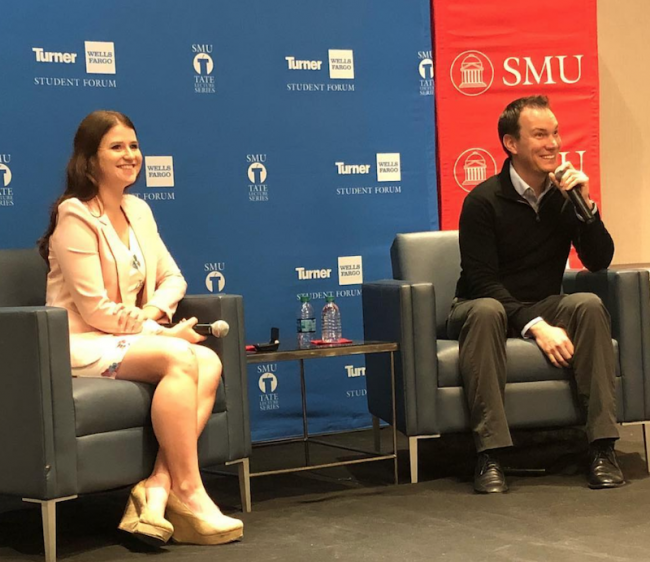Waco’s very own Shawn Achor filled the seats of McFarlin Auditorium at 8 p.m. Tuesday night. Achor is a happiness researcher, speaker, Harvard graduate and New York Times best-selling author of two books: The Happiness Advantage and Big Potential, which speaks to his advocacy of positive psychology. Achor has worked in 50 countries, with Fortune 100 CEOs, and everywhere from Harvard University to shantytowns in Zimbabwe. He has also met Oprah.
The lecture began with Achor talking about his childhood.
“I started all of this academic research when I was just seven years old,” Achor said.
He told the story of when he was just a young boy playing with his little sister, Amy, just two years younger. One night, well past their bedtime, they were roughhousing on their bunk beds, playing a game of “war.” Five-year-old Amy suddenly fell off the bed and landed painfully on the floor on all fours. Achor had broken his sister’s arm just a week before this incident and had been trying to be on his best behavior for his parents.
“I saw on my sister’s face this wail of pain, suffering, and surprise – threatening to erupt from her mouth and wake up my sleeping parents. So I did the only thing I could think to do,” Achor said.
As Amy started to cry, Achor asked his sister how she landed on all fours like that, explaining how mystical it was. “This must mean you’re a baby unicorn,” he’d said, and suddenly the tears subsided.
“Instead of crying, seizing our play and waking our parents, she focused on this newfound identity of being a baby unicorn,” Achor said.
This story is the basis of Achor’s lecture: choosing positivity over negativity.
Our brain receives 11 million pieces of information every second from nerve endings.
“As you process life and create this reality, your brain is only processing a few snowflakes in the midst of a blizzard,” Achor says.
This means our brain first scans the negatives, hassles, complaints, frustrations and threatsin the world. Then, our brain has no resources left to scan the things we’re grateful for in the present moment.
Throughout the lecture, Achor explained all the distractions and struggles we all have in the midst of striving for happiness. However, one thing is a constant.
“Happiness is a choice, just change the way you allocate those resources and then you can choose happiness,” Achor said.
“When you wake up in the morning, write a two-minute positive email or text message praising or thanking one person in your life. A family member, a coach, a peer, a high school English teacher,” Achor said.
This is one habit Achor shares everywhere he speaks that has created positive change for thousands.
If you consistently pursued this habit every day and tested your social connection score after three weeks, your score would be in the top 10 percent of people in the world.
“Social support and connection are important because the people that you surround yourself with are the greatest predictor of your long-term levels of happiness by far. The height of our potential is actually in relation to the people that are surrounding us. Social connection is as predictive of how long you are living as much as obesity, high blood pressure, or smoking, ” Achor said.
Just taking two minutes out of your day to send a short email to your old football coach can extend your life as much as if you stopped smoking, Achor said.
“We fight so hard against the negative in this world but we forget to tell people how powerful positive can be, Achor said.











